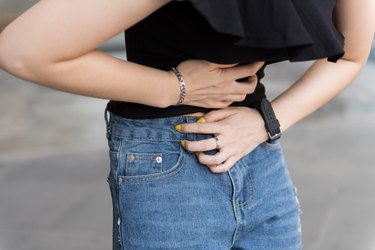
You'd probably expect your stomach to feel sore the day after you'd completed a marathon exercise routine, complete with multiple stomach crunches. But if your stomach feels sore even if you haven't exercised, you should look further for the cause and consider scheduling a visit to your physician.
Several physical problems can mimic the stomach soreness sensation you get from exercise, and it's possible your doctor may be able to treat the problem with medication, alleviating that soreness.
Video of the Day
Video of the Day
Heartburn or Gastroesophageal Reflux Disease
Pain from heartburn — technically called gastroesophageal reflux disease — can feel a lot like the sore stomach muscles you experience from exercise. According to the American Gastroenterological Association, the pain can feel like a burning in your chest area.
Sometimes, particular foods such as chocolate or fried foods can trigger heartburn pain. Your doctor can diagnose gastroesophageal reflux disease through your description of the symptoms or by using several different medical tests. You may be able to treat it through changes in your diet and lifestyle, or your doctor may recommend medication.
Ulcers and Stomach Soreness
An ulcer — a hole in the lining of your stomach — also can trigger stomach soreness that doesn't result from exercise. Years ago, doctors thought ulcers stemmed from too much acid in your stomach. But now, it's clear that a form of bacteria called H. pylori causes the vast majority of ulcers, according to Mayo Clinic.
Smoking increases the odds of your getting an ulcer, which you can treat with acid-blocking medications, antibiotics and lifestyle changes.
Gallbladder Disease and Pain
Although the pain from gallbladder disease often feels more acute than mere stomach soreness, it occasionally can feel as if you have a pulled muscle in your abdomen area. Gallstones or gallbladder disease cause intermittent pain in your upper stomach area, usually on the right side of your body. You may feel the soreness or pain increase as you breathe in according to John Hopkins Medicine.
Your doctor can use ultrasound or another medical imaging test to determine if you have gallstones. If you do, your physician may recommend a wait-and-see approach — in many cases, the pain will subside and you won't need any treatment. In serious cases or in cases where the gallbladder becomes inflamed or infected, your doctor may recommend surgery to remove it.
Sore Abdominal Muscles Without Exercise
Stress and anxiety can cause stomach soreness or muscle pain that feels remarkably like the soreness you'd experience from overworking your stomach muscles through exercise. Your nervous system connects your brain and your gut in ways that scientists don't yet fully understand, and stress or anxiety — even mild cases — can slow down your digestive system, especially in particularly sensitive people.
If this happens to you frequently and your physician can't find a physical cause for your stomach soreness, you might benefit from some forms of psychotherapy, including hypnosis or relaxation therapy according to Harvard Health.